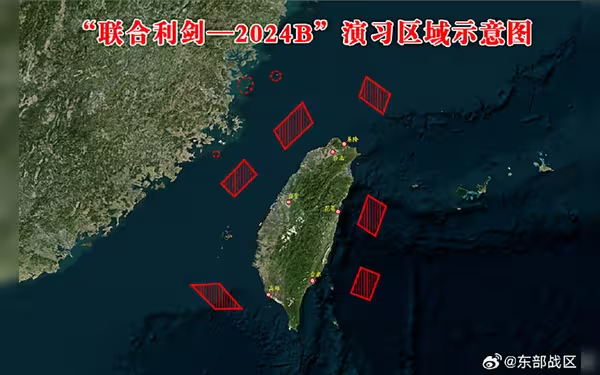Saturday, November 16, 2024 07:36 PM
China Conducts Military Exercises Near Taiwan Without End Date
- China initiates military drills near Taiwan amid rising tensions.
- Taiwan's President asserts independence, provoking Beijing's disapproval.
- Ongoing exercises raise concerns over regional peace and stability.
 Image Credits: arabnewspk
Image Credits: arabnewspkChina begins military exercises near Taiwan, escalating tensions as Taiwan asserts independence amid international scrutiny.
In recent developments, China has initiated a new series of military exercises near Taiwan, which it claims are a response to what it describes as the "separatist acts of Taiwan independence forces." This announcement has raised alarms in Taiwan, a self-governing island that China considers part of its territory. The exercises began on Monday, and notably, no end date has been provided, leading to concerns about escalating tensions in the region.
Taiwan has been on high alert following a national day speech by President Lai Ching-te, where he asserted that China has no right to represent Taiwan. This statement was met with strong disapproval from Beijing, which has historically viewed any assertion of Taiwanese independence as a direct challenge to its sovereignty. The Chinese military's Eastern Theatre Command has labeled the ongoing drills, named "Joint Sword-2024B," as a necessary operation to safeguard state sovereignty and national unity.
The drills are taking place in the Taiwan Strait and surrounding areas, with a map released by the Chinese military indicating nine specific locations for the exercises. These include regions on both the east and west coasts of Taiwan, as well as areas near Taiwan-controlled islands. The Chinese military has stated that its ships and aircraft are conducting operations in close proximity to Taiwan, focusing on combat-readiness and potential blockades of key ports.
Despite the intensity of these military maneuvers, the Chinese military has not announced any live-fire exercises or designated no-fly zones, which were prominent in previous drills. For instance, in 2022, following a visit by then-US House Speaker Nancy Pelosi to Taiwan, China conducted missile tests over the island. The current situation has prompted Taiwan's Mainland Affairs Council to label China's actions as "blatant provocations" that threaten regional peace and stability.
In response to these military threats, Taiwan's defense ministry has mobilized its forces, emphasizing its commitment to maintaining peace and stability in the Taiwan Strait. President Lai has expressed a willingness to engage in dialogue with China, despite the latter's refusal to acknowledge such overtures. He has reiterated that only the people of Taiwan can determine their future, firmly rejecting Beijing's claims of sovereignty.
As tensions continue to rise, the international community watches closely. The United States has previously stated that China lacks justification for its military pressure, particularly in light of President Lai's national day speech. The situation remains fluid, with both sides preparing for potential escalations.
The ongoing military exercises by China near Taiwan serve as a stark reminder of the fragile state of cross-strait relations. While Taiwan seeks to assert its independence and maintain peace, China's military posturing raises significant concerns about the potential for conflict. As the world observes these developments, it is crucial for all parties involved to prioritize dialogue and diplomacy to prevent further escalation and ensure stability in the region.













